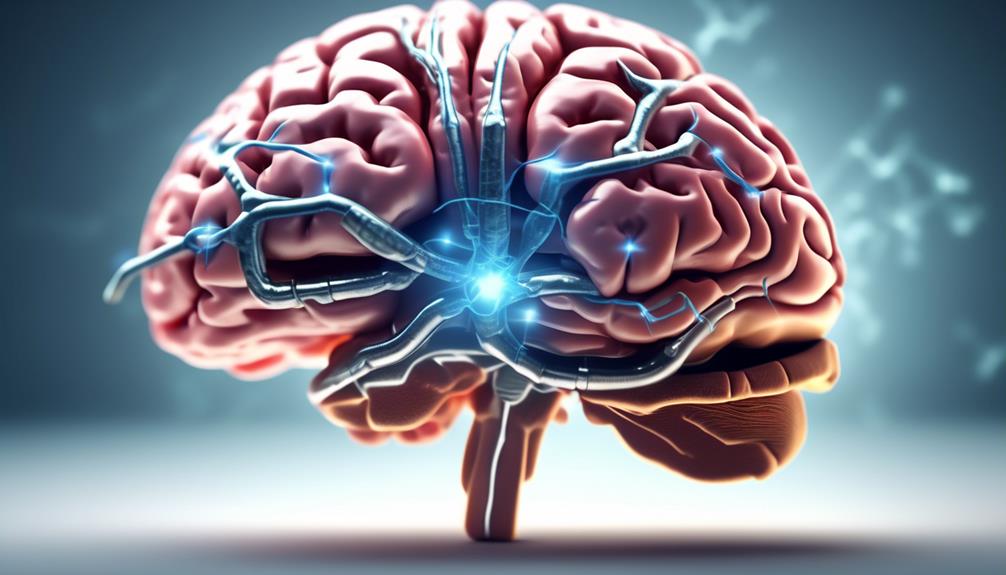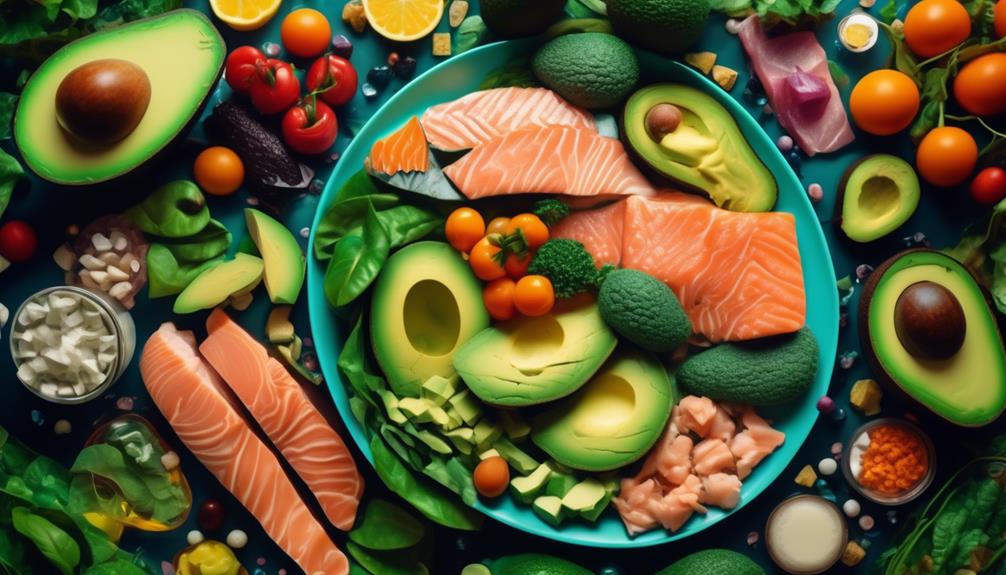Coincidentally stumbling upon the key to appetite control may sound too good to be true, but when it comes to harnessing the hormonal effects of the keto diet, it just might be possible.
By understanding how certain hormones like insulin, ghrelin, leptin, and cortisol are influenced by the ketogenic lifestyle, you can begin to unlock the secrets of managing your appetite more effectively.
So, if you're tired of constantly battling cravings and want to regain control over your hunger, keep reading to discover how the keto diet can optimize your hormonal balance and help you achieve your weight management goals.
Understanding the Role of Insulin

To understand the role of insulin in appetite control, it's essential to recognize its impact on regulating blood sugar levels and influencing hunger signals in the body. Insulin is a hormone produced by the pancreas that plays a crucial role in maintaining glucose homeostasis. When you consume carbohydrates, your body breaks them down into glucose, which enters the bloodstream. In response, the pancreas releases insulin to help transport glucose from the bloodstream into cells, where it can be used for energy or stored as glycogen.
Insulin also plays a key role in appetite regulation. It helps to signal to the brain when you're full and should stop eating. This is achieved through the interaction between insulin and various hormones, including leptin and ghrelin, which are involved in hunger and satiety.
Insulin sensitivity and insulin resistance are two important factors that affect appetite control. Insulin sensitivity refers to the body's ability to respond to insulin, allowing for efficient glucose uptake into cells. On the other hand, insulin resistance occurs when the body's cells become less responsive to insulin, leading to elevated blood sugar levels and increased production of insulin.
In individuals with insulin resistance, appetite control may be disrupted, leading to increased hunger and cravings. This can contribute to overeating and weight gain. On the other hand, improving insulin sensitivity through lifestyle modifications, such as a low-carbohydrate ketogenic diet, can help regulate appetite and promote weight loss.
The Impact of Ketones on Appetite
When it comes to appetite control, ketones play a significant role. Research has shown that the presence of ketones in the body can increase feelings of satiety, making you feel fuller for longer periods of time.
Additionally, ketones have been found to affect hunger signals, helping to reduce cravings and regulate food intake. Understanding the impact of ketones on appetite can be beneficial for those following a ketogenic diet.
Ketones and Satiety
Ketones play a significant role in regulating appetite and promoting satiety. When you follow a ketogenic diet, your body enters a state of ketosis, where it produces ketones as an alternative fuel source. These ketones not only help to enhance your metabolism but also have an impact on your weight loss efforts.
Research shows that ketones have the ability to suppress appetite and reduce food cravings, which can be beneficial for weight management. One study found that individuals who consumed a ketogenic meal experienced reduced hunger levels compared to those who'd a high-carbohydrate meal.
Another study demonstrated that ketones can increase the production of appetite-suppressing hormones, such as cholecystokinin (CCK) and peptide YY (PYY). These hormonal effects of ketones contribute to a greater feeling of fullness and satisfaction after meals, ultimately supporting appetite control and satiety.
Ketones and Hunger Signals
As your body enters a state of ketosis and produces ketones as an alternative fuel source, these ketones have a significant impact on your hunger signals and appetite control. Here are four ways in which ketones affect your hunger signals:
- Ketones and brain: Ketones have the ability to cross the blood-brain barrier and provide energy to the brain cells. This can help improve cognitive function and reduce cravings.
- Appetite suppressing effects: Ketones have been shown to increase the production of appetite-suppressing hormones such as cholecystokinin (CCK) and peptide YY (PYY). These hormones help to decrease hunger and promote feelings of fullness.
- Reduced insulin levels: The ketogenic diet, which increases ketone production, can lead to lower insulin levels. This is important because insulin is a hormone that promotes hunger and fat storage.
- Increased fat burning: When your body is in ketosis, it becomes more efficient at burning fat for fuel. This can lead to weight loss and a decrease in appetite.
How Keto Affects Ghrelin Levels

The ketogenic diet has been shown to modulate ghrelin levels, thereby impacting appetite control. Ghrelin is a hormone that's primarily produced in the stomach and plays a key role in stimulating hunger. When ghrelin levels are high, it signals to the brain that it's time to eat, leading to increased appetite and food intake.
Research has found that following a ketogenic diet can lead to a reduction in ghrelin levels. A study published in the journal Obesity found that individuals on a ketogenic diet experienced a significant decrease in ghrelin levels compared to those on a high-carbohydrate diet. This suggests that the ketogenic diet may help to suppress hunger and reduce overall food cravings.
The exact mechanism by which the ketogenic diet affects ghrelin levels isn't fully understood. However, it's believed that the increase in ketone bodies, which are produced when the body is in a state of ketosis, may play a role. Ketones have been shown to have appetite-suppressing effects, and it's possible that they may directly or indirectly influence ghrelin production.
Leptin and the Hunger-Satiety Balance
Leptin, a hormone produced by fat cells, plays a crucial role in regulating hunger and satiety. When levels of leptin are high, it signals to the brain that you're full and can reduce appetite.
However, in conditions of leptin resistance, the brain doesn't respond to the hormone's signals, leading to increased hunger and overeating.
The ketogenic diet has been found to improve leptin sensitivity, helping to restore the hunger-satiety balance and promote appetite control.
Leptin's Role in Hunger
A crucial hormone in regulating hunger and satiety, leptin plays a significant role in maintaining the balance between the two. Leptin is produced by fat cells and signals the brain to reduce appetite and increase energy expenditure. However, when the body becomes resistant to leptin, its appetite-suppressing effect diminishes. This leads to increased hunger and a decreased ability to feel full, which can contribute to overeating and weight gain.
Understanding leptin's mechanism is key to addressing leptin resistance and managing hunger effectively. By following a ketogenic diet, which is low in carbohydrates and high in healthy fats, you can improve leptin sensitivity and restore the hunger-satiety balance. Additionally, incorporating regular exercise and maintaining a healthy sleep pattern can also support healthy leptin levels.
To harness the benefits of leptin, consider the following strategies:
- Reduce carbohydrate intake and focus on consuming healthy fats.
- Engage in regular physical activity to enhance leptin sensitivity.
- Prioritize quality sleep to optimize leptin production.
- Consider intermittent fasting to support leptin regulation.
Keto's Impact on Leptin
By following a ketogenic diet, you can effectively influence leptin levels and restore the balance between hunger and satiety. Leptin is a hormone that plays a crucial role in weight regulation. It's produced by fat cells and acts on the brain to signal fullness and reduce appetite.
Studies have shown that a ketogenic diet can increase leptin sensitivity, leading to improved appetite control and weight loss. The ketogenic diet promotes ketosis, a metabolic state where the body uses ketones as its primary source of energy instead of glucose. This metabolic shift not only helps in weight loss but also influences leptin levels.
Achieving Appetite Control
To achieve appetite control and maintain a healthy hunger-satiety balance, it's important to understand the role of leptin, a hormone that signals fullness and reduces appetite. Leptin plays a crucial role in the hormonal regulation of appetite suppression. Here are four key factors to consider:
- Leptin resistance: In some individuals, the body becomes resistant to the effects of leptin, leading to increased appetite and overeating. Keto diet has been shown to improve leptin sensitivity, helping to restore normal appetite regulation.
- Protein intake: Including an adequate amount of protein in your diet can increase leptin production and promote satiety. Keto diet, which is rich in protein, can support appetite control.
- Healthy fat consumption: Incorporating healthy fats into your meals can enhance the release of leptin and reduce hunger. The ketogenic diet is known for its emphasis on healthy fats, which can contribute to appetite suppression.
- Balanced meal planning: Structuring your meals to include a combination of protein, healthy fats, and fiber-rich vegetables can optimize leptin production and promote a balanced hunger-satiety cycle.
Cortisol and Its Influence on Cravings
Cortisol, a hormone released in response to stress, has a significant influence on your cravings. When cortisol levels rise, it can trigger stress eating and emotional cravings, leading to the consumption of high-calorie, comfort foods. Research has shown that cortisol can stimulate the brain's reward center, making you more likely to seek out pleasurable foods, particularly those high in sugar and fat.
Stress eating, driven by cortisol, is often characterized by a desire for quick energy and a temporary escape from negative emotions. These cravings aren't driven by hunger but rather by the body's response to stress. When cortisol levels remain elevated for extended periods, it can disrupt the balance of other hormones involved in appetite regulation, such as leptin and ghrelin, making it even more challenging to control cravings and maintain a healthy weight.
Fortunately, the ketogenic diet can help regulate cortisol levels and mitigate the impact it has on cravings. By reducing carbohydrate intake and increasing fat consumption, the keto diet promotes a more stable blood sugar level, preventing spikes and crashes that can trigger cortisol release. Additionally, the keto diet has been shown to improve stress resilience, reducing the body's overall cortisol response.
Optimizing Hormonal Balance on the Keto Diet

The ketogenic diet offers a promising approach to optimizing hormonal balance, enhancing appetite control, and reducing the impact of cortisol on cravings.
By following a keto diet, you can effectively regulate your hormones and suppress your appetite, leading to better weight management and overall health.
Here are some ways the keto diet can help optimize hormonal balance and promote appetite suppression:
- Insulin regulation: The keto diet restricts carbohydrates, leading to lower insulin levels. This helps regulate insulin sensitivity and prevents insulin spikes, which can contribute to weight gain and cravings.
- Ghrelin reduction: The keto diet has been shown to decrease ghrelin, also known as the 'hunger hormone.' By reducing ghrelin levels, you can experience reduced feelings of hunger and improved appetite control.
- Leptin sensitivity: Leptin is a hormone that signals satiety to the brain. The keto diet has been found to enhance leptin sensitivity, allowing your body to better respond to its signals of fullness.
- Improved cortisol balance: Cortisol, the stress hormone, can impact appetite and cravings. The keto diet helps reduce cortisol levels, minimizing its effect on your appetite and reducing emotional eating.
Conclusion
In conclusion, harnessing the hormonal effects of the keto diet can be a powerful tool for appetite control.
By understanding the role of insulin, the impact of ketones on appetite, and how keto affects hormones like ghrelin, leptin, and cortisol, we can optimize our hormonal balance and manage cravings more effectively.
The keto diet offers a science-based approach to achieving and maintaining a healthy weight.
So why not give it a try and take control of your appetite today?







